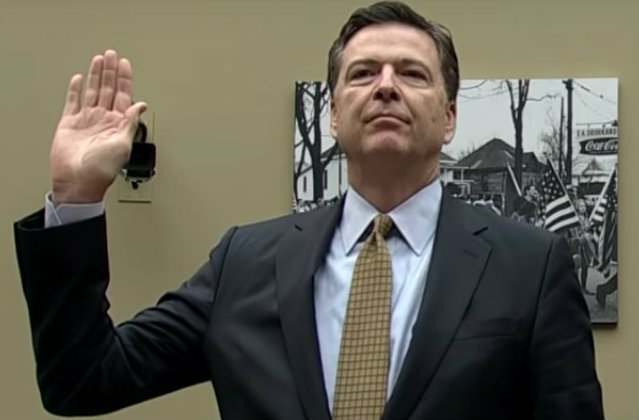 Law professor Jonathan Turley opined this morning in The Hill about the effort to dismiss Comey’s admitted leaking as not really a leak, due to the tendency of those in law and media to lionize the former FBI director out of partisan considerations.
Law professor Jonathan Turley opined this morning in The Hill about the effort to dismiss Comey’s admitted leaking as not really a leak, due to the tendency of those in law and media to lionize the former FBI director out of partisan considerations.
Turley addresses several common arguments made on Comey’s behalf and dismantles them in turn.
First is the idea that Comey couldn’t have leaked because leaking only refers the release of classified information. An easy refutation and exceptionally odd argument to make, because, well, it’s flat-out wrong, he says. Two federal statutes (18 USC § 641 and 18 USC § 1905) and the FBI’s own non-disclosure agreement provide the relevant definitions here. All three sources show that Comey is actually, by definition, a leaker. Turley’s dismissal of this argument leaves one wondering whether those making it are simply acting out of ignorance or as part of a hope-nobody-actually-checks-this confidence scheme.
Second, Professor Turley addresses the notion that since Comey just read the contents of the memos to reporters, he wasn’t in violation of federal rules or regulations. This argument appears to be made out of whole cloth because Comey did, by his own admission, give the memos to his friend Daniel Richman. In any event, even if Comey had simply read the contents of the memos to the press, that wouldn’t augur well for his defenders. As Turley notes, “There is no Aesop exception that allows for unauthorized dissemination of information so long as it is in the form of a story.”
Then there’s the argument that Comey was somehow protected by—and simultaneously immune to—professional legal ethics rules. First of all, D.C. Bar Rule 1.6 clearly indicates Comey engaged in an ethical breach, Turley claims. As for the protective tissue seemingly offered by the ethical rules, attorney Stephen Kohn had put forth the following collection of words in an attempt to string together this bit of reasoning, “[I]n the context of lawyer-client privilege, if a client attacks the lawyer publicly, the lawyer can self-defend.” This, Turley says, misses the point entirely. Trump was was not Comey’s client; Comey’s client was the Department of Justice. Therefore, the material Comey leaked–part of an ongoing FBI investigation–could only be legally released by the FBI with the DOJ’s approval. Turley offers the obvious outcome to Kohn’s tortured logic:
“[T]he implications of this relaxed rule for Comey is staggering. It suggests that whenever a government attorney is criticized by a president or some other high ranking official, suddenly confidential or nonpublic information can be weaponized for use in the media.”
Then there’s the argument that since Comey waited until after he was fired to release the memos, he can’t be touched. While noting that some laws are aimed directly at current government employees, Turley says other laws don’t distinguish between current employees and former employees where the removal and use of government material is concerned. And, again, internal FBI regulations are explicit: “FBI personnel must surrender all materials in their possession that contain FBI information upon FBI demand or upon separation from the FBI.” This, Turley says, could provide the basis for the FBI’s prosecution of Comey for unlawful possession.
Finally, Turley goes after the idea that James Comey is a protected whistleblower. Simply put, the professor says this is just false. Federal whistleblower protections require certain actions, including the proactive claiming of such protection–which Comey has not done, Turley says. The professor writes:
If these memos constitute FBI information (as they appear), Comey had no authority under whistleblower laws to remove them and disseminate the information. Indeed, had an agent made such disclosure while Comey was director, he would not likely have been so forgiving or casual toward the disclosures.
A strong case against the legions of Comey’s newly-minted fanbase. Turley’s message here is, essentially, “You can’t have your Comey cake and eat it, too.”
[image via screengrab/C-SPAN]